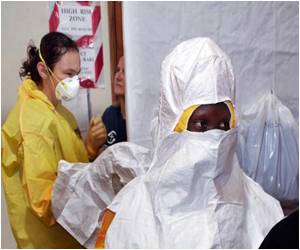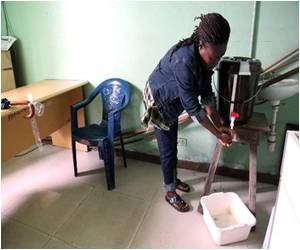The Ebola virus is spreading rapidly and to an unexpected extent and the outbreak does not follow the patterns experienced in the past.

In the statement the academies call for the following consequences to be taken: To combat the Ebola epidemic vaccines and antivirals are urgently needed. To meet this need, the further development of experimental vaccines and medicines for clinical application needs to be accelerated. Even if the pathogen should temporarily disappear again, research must continue as a precautionary measure because another outbreak is highly probable. Such precautionary measures must also include ensuring that sufficient quantities of available vaccines and antivirals are stockpiled in case of a new outbreak. Increasing medical and social science research in this area is also vitally important for future preparedness.
Background
On 8 August, the World Health Organisation (WHO) declared the Ebola outbreak in West Africa to be an international public health emergency. In particular, the WHO advised that:
- 1. The Ebola outbreak in West Africa constitutes an 'extraordinary event' and a public health risk to other States;
2. The possible consequences of further international spread are particularly serious in view of the virulence of the virus, the intensive community and health facility transmission patterns, and the weak health systems in the currently affected and most at-risk countries.
Advertisement
Advertisement
Since its discovery in 1976, there have been repeated outbreaks of the Ebola virus, which were generally contained to remote regions of Central Africa and never amounted to more than 500 cases. The current outbreak of the virus is entirely different to past outbreaks. After the first cases were recorded in early 2014 in South-West Guinea, the disease has spread rapidly. Alongside Guinea, Sierra Leone and Liberia, with its million-plus capital Monrovia, have been hit especially hard. The spread of the virus has been accelerated by multiple factors including disastrous hygiene conditions, the collapse of the medical infrastructure and a lack of public awareness. Over 8000 cases were registered by 5 October 2014. About half of the people infected have died. The death toll includes many doctors and nursing staff and an end to the outbreak is not in sight. From the beginning, the local healthcare systems have been supported by international aid organisations: Doctors Without Borders and the European Mobile Laboratory Project were the first to come to the region in March 2014. From very early on, these organisations have repeatedly said that the outbreak will not be contained without a massive increase in medical and epidemiological aid.
The Ebola virus and its progression
The Ebola virus and the Marburg virus are filoviruses, research on which started with discovery of the Marburg virus in 1967. Research in this area that has been carried out in Germany has significantly contributed to understanding the nature of the Ebola virus. This research furthermore delivered important approaches to control and fight the virus, such as the procedures to identify the virus which are being applied by the European Mobile Laboratory in the current outbreak. In addition, one of the two vaccines to be tested in the clinic is based on research originally carried out in Germany.
Ebola viruses are transmitted from animals to humans. Fruit bats are presumed to be the natural reservoir of the virus. The Zaire species of Ebola virus, responsible for the current outbreak in West Africa, causes a particularly severe form of haemorrhagic fever. The disease progresses primarily with massive virus proliferation and immune dysfunction. The main symptoms are fever, diarrhoea, vomiting and impaired coagulation, leading to multiple organ failure and shock. Initial examinations of the genetic material have shown that the virus is different to past strains with numerous genetic changes (mutations), but the significance of this is not known.
Experimental medicines and vaccines
There are as yet no vaccines or antiviral drugs that have been registered for human use. Interventions that are still in an experimental phase, some of which were developed over 10 years ago, have now taken on a special importance. These include antiviral drugs based on nucleic acid molecules (siRNA) and therapeutic antibodies, and vaccines based on recombinant viruses. Under pressure of current events, the vaccines and therapeutics that have shown good results in animal experiments are now being tested in initial clinical studies. The process of moving from the experimental phase to clinical application will certainly be cost-intensive and time-consuming. The thought that numerous lives could have been saved, had this process been started earlier, is depressing.
Consequences
The Ebola virus epidemic on this scale presents completely new challenges, both to the countries that are directly affected and the international community. Germany, together with other industrialised countries, has an important role to play here. Some of the key consequences that need to be taken are:
Strengthen international collaboration and capacities
- (I) Each outbreak requires an immediate and coordinated response from the international community based on internationally agreed strategies. Adequate regulations and processes must be established to ensure that quick decisions on the application of experimental medicines and vaccines can be made in an emergency.
(II) The personnel and institutional capacities of the healthcare systems in less developed countries must be further established and sustainably improved, adjusted to the respective cultural context. In addition, in industrialised countries, we need to critically assess whether current capacities are adequate and fit for future demands. Public awareness of the course of infections must be increased in the countries particularly affected by the Ebola virus epidemic and the cultural context should not be underestimated. Governments and other decision-makers must also be made more aware of the dimensions of the problem. Therefore, application of findings from social and cultural science studies and approaches that go beyond the purely medical measures are also of great importance.
- (III) At the national and international levels, we need to gain a detailed infection biology characterisation of the current virus. Research should focus particularly on the pathogenic effect of different Ebola virus strains, on transmission, host adaptation and ecology of the pathogens. This work must be done within the broader context of understanding changes in the global climate, ongoing trends of urbanisation and the ever growing international mobility of persons.
(IV) Research in social and cultural sciences is of increasing importance for future preparedness. In addition, approaches to treatment of patients with highly pathogenic viruses should be incorporated to a greater extent into the training of medical professionals.
- (V) To meet the urgent need for vaccines and drugs, the further development of experimentally effective vaccines and therapeutics must be accelerated to reach clinical application. This drive must also be pursued, even when the pathogen has disappeared again. The precautionary principle must be given priority. National and international parameters must be established to enable testing of prospective vaccine candidates on non-human primates under high-security (BSL 4) conditions.
(VI) The discovery and development of vaccines and drugs cannot solely be subject to market economy principles. The international community, foundations and non-government organisations need to take action. In this context it is vital to ensure that in case of another outbreak, adequate supplies of effective vaccines or antivirals are provided once they are available.
Source-Eurekalert











